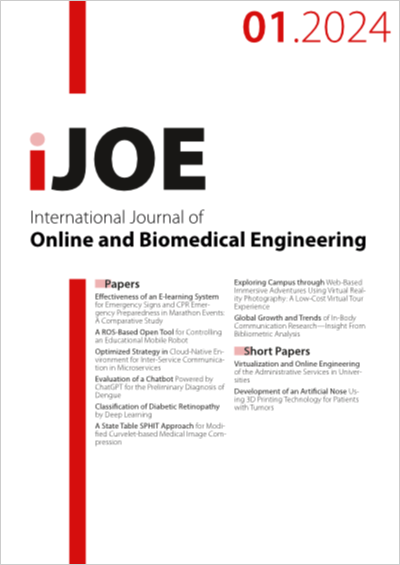Exploring Campus through Web-Based Immersive Adventures Using Virtual Reality Photography: A Low-Cost Virtual Tour Experience
DOI:
https://doi.org/10.3991/ijoe.v20i01.44339Keywords:
virtual reality, virtual tour, educational technology, web-mobile applicationAbstract
This study aims to assess the incorporation of virtual reality (VR) photography into the web-based immersive application “virtual interactive campus tour (VICT).” This application offers users an immersive experience, allowing them to virtually explore university campuses and access information about the facilities and services available. The VICT application offers a cost-effective, attractive, and sustainable alternative for universities to display their resources and interact with potential students. Through black box testing, we conducted user acceptance testing (UAT) and functionality testing, confirming the application’s readiness for deployment and its capability to meet institutional and end-user requirements. This study also examined the potential for universities to use VR to meet the expectations of prospective students. The application is compatible with both desktop and mobile devices. The results indicated that the overall average validity score was 0.88, suggesting that the measure is valid. The validation results were thoroughly tested and reliable. This study emphasizes the potential of immersive web-based tours in higher education and aims to bridge the divide between virtual exploration and physical visits. By offering an immersive virtual campus experience, this innovative tool has the potential to revolutionize university marketing strategies, increase student engagement, and transform campus visit approaches.
Downloads
Published
How to Cite
Issue
Section
License
Copyright (c) 2023 Agariadne Dwinggo Samala, Marina Ricci, Christian Jonathan Angel Rueda, Ljubisa Bojic, Fadhli Ranuharja, Winda Agustiarmi

This work is licensed under a Creative Commons Attribution 4.0 International License.



